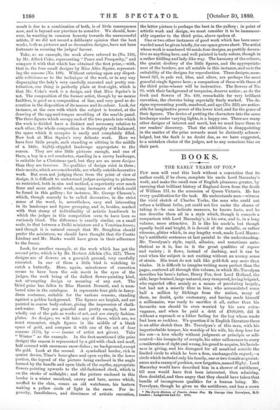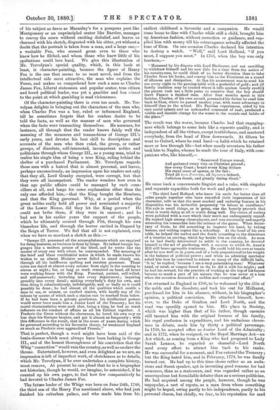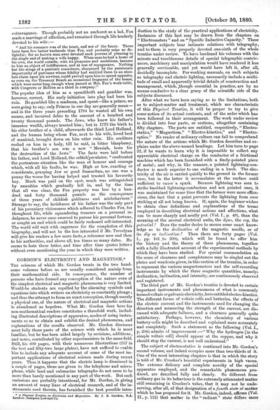BOOKS.
THE EARLY YEARS OF FOX.*
FEW men will read this book without a conviction that its author could, if he chose, complete his uncle Lord Macaulay's work, and make the small sum of English pleasures greater, by carrying that brilliant history of England down from the death of William III. to the accession of Queen Victoria. He has every qualification for the task. He understands men—witness the vivid sketch of Charles Yorke, the man who cOuld not refuse a brilliant bribe, yet could not live under the shame of taking it—he can indicate manners, he knows facts, and he can describe them all in a style which, though it compels a comparison with Lord Macaulay's, is his own, and is, in a long volume, more attractive. It is like his uncle's, but though equally lucid and bright, it is devoid of the metallic, or rather vitreous, glitter which, in any lengthy work, made Lord Macau- lay's antithetic sentences at last painful to the understanding. Mr. Trevelyan's style, rapid, allusive, and sometimes ante- thetical as it is, has in it the great qualities of repose and variety ; it flows, instead of dashing, and it can be read when the subject is not exciting without an uneasy sense of strain. His trout do not talk like gold-fish any more than whales. It is difficult to imagine writing more perfect than the pages, scattered all through this volume, in which Mr. Trevelyan describes his hero's father, Henry Fox, first Lord Holland, the able, large-brained, large-natured, easy-tempered, loving brigand, who regarded office mainly as a means of peculating largely, but had not a miserly fibre in him ; who accumulated some half a million by filchings from the nation, many of them, no doubt, quite customary, and having made himself a millionaire, was ready to sacrifice it all, rather than his favourite son should be even worried by his own extra- vagance, and when he paid a debt of £100,000, did it without a reproach or a bitter feeling for the boy whose waste had been so reckless. 'We question if in English literature there is an abler sketch than Mr. Trevelyan's of this man, with his imperturbable temper, his worship of his wife, his deep love for his son—a love wholly without judgment or principle or self- control—his incapacity of scruple, his utter callousness to every consideration of right and wrong, his greed to acquire, hislavish, ness in giving, and his disregard for all mankind outside the limited circle to which he bore a firm, unchangeable regard,—a circle which included only his family, one or two female acquaint- ances and a scamp of position, now forgotten,named Rigby. Lord Macaulay would have described him in a shower of antitheses, . till men would have first been interested, then admiring, then doubtful, and then angry that they should have taken that bundle of incongruous qualities for a human being. Mr. Trevelyan, though he gives us the antitheses, and has a scorn • The Early History of Charles James Fox. By George Otto net-0pin, 5.!.. P. London ; Longman' and Co. 1880,
of his subject as fierce as Macaulay's for a pompous poet like Montgomery or an unprincipled, orator like Barrere, manages to convey the scorn without exciting disbelief, and leaves us charmed with his sketch, disgusted with his sitter, yet without a doubt that the portrait is taken from a man, and a large one,— a veritable Fox, who seemed great- even to those who knew how he filched, and whom those who knew little of his spoliations could love hard. We give this illustration of Mr. Trevelyan's special quality, which, in this book at least, is character-painting, because the figure of Henry Fox is the one that seems• to us most novel, and from the intellectual side most attractive, the man who explains the Foxes, and makes us comprehend how such a man as Charles James Fox, Liberal statesman and popular orator, true citizen and loved political leader, was yet a gambler and bon vivant to the point at which gambling is mad viciousness.
Of the character-painting there is even too much. Mr. Tre- velyan delights in bringing out the characters of the men who, when Charles Fox was a boy, ruled or influenced England, till he sometimes forgets that his readers desire to be told the facts, as well as the manner of men who governed when the facts were transacting themselves. He assumes, for instance, all through that the reader knows fairly well the. meaning of the measures and transactions of George LII.'s early years, and devotes his best skill to descriptions and accounts of the men, who then ruled, the group, or rather groups, of dissolute, self-interested, incompetent nobles and politicians through whom George III., as a young man, tried to realise his single idea of being a true King, ruling behind the shelter of a purchased Parliament. Mr. Trevelyan regards these men with a hatred that is almost personal, and leaves, perhaps unconsciously, an impression upon his readers not only that they all, Lord Granby excepted, were corrupt, but that they were all incompetent. The reader wonders how even in that age public affairs 'could be managed by such coun- cilors at all, and longs for some explanation other than the only one afforded him,—that the King bought the Members, and that the King governed. Why, at a period when the great nobles really held all power and nominated a majority of the Lower House, did they let the King govern? He could not bribe them, if they were in earnest ; and he had not in his earlier years the support of the people, which he ultimately secured through Pitt, through his own blameless life, and through the horror excited in Engand by the Reign of Terror. We feel that all is not explained, even when' wehave so mordant a sketch as this :—
"George III. possessed all the accomplishments which are required for doing business, as business is done by kings. He talked foreign lan- guages like a modern prince of the blood, and he wrote like the master of every one with whom he corresponded. The meaning of the brief and blunt confidential notes in which he made known his wishes to an absent Minister never failed to stand clearly out, through all his indifferent spelling and careless grammar. Those notes are dated at almost every minute from eight in the morning to eleven at night ; for, as long as work remained on hand, all hours were working hours with the King. Punctual, patient, self-willed, and self-possessed ; intruding into every department ; inquiring greedily into every detail ; making everybody's duty his own, and then doing it conscientiously, indefatigably, and as badly as it could possibly be done ; he had almost all the qualities which enable a man to use, or misuse, an exalted station, with hardly any of the talents by means of which such a station can be reached from below. If be had been born a private gentleman, his intellectual powers would never have made him a Junior Lord of the Treasury; but his moral characteristics were such that, being a king, he had as much influence on the conduct of affairs as all his Cabinet together. A Frederic the Great without the cleverness, he loved his own way no less than his German brother, and got it almost as frequently ; with this difference in the result, that in the score of years during which he governed according to his favourite theory, he weakened England as much as Frederic ever aggrandised Prussia."
That is perfect, though a word might have been said of the brain-disease which must always have been lurking in George and of the honest thoroughness of his conviction that the Whig " connection " would ruin the country, as well as enslave the throne. Entertained, however, and even delighted as we are, an impression is left of imperfect work, of sketchiness as to details, which Mr. Trevelyan, if he ever undertakes a complete history, must remove, At present he can plead that he is a biographer not historian, though he would, we imagine, be astonished, if he counted up his own pages, to find how few comparatively he had devoted to Charles James Fox.
The future leader of the Whigs was born on June 24th, 1749, the third son of the Henry Fox mentioned above, who had just finished his suburban palace, and who made him from his
earliest childhood a favourite and a companion. He would come home to dine with Charles while still a child, brought him up American fashion, without correction or guidance, and sup- plied him with money till his extravagance actually affected the tone of Eton. On one occasion Charles declared his intention to destroy a watch. " Well," said Lord Holland, " if you must, I suppose you must." In 1763, when the boy was only fourteen,—
" Harassed by his dispute with Lord Shelburne, and not unwilling to withdraw himself and his new title for a time from the notice of his countrymen, he could think of no better diversion than to take Charles from his books, and convey him to the Continent on a round of idleness and dissipation. At Spa his amusement was to send his son every night to the gaming-table with a pocketful of gold ; and (if family tradition may be trusted where it tells against family credit) the parent took not a little pains to contrive that the boy should leave France a finished rake. After four months spent in this fashion, Charles, of his own accord, persuaded his father to send him back to Eton, where he passed another year, with more advantage to himself than to the school. His Parisian experiences, aided by his rare social talents and an unbounded command of cash, produced a visible and durable change for the worse in the morals and habits of the place."
The result was the worse, because Charles had that engaging- ness which belongs to some lads like a separate quality, and is independent of all the virtues, except truthfulness, and mastered everybody, from the head of Eton downwards. At fifteen he went to Oxford, where he read hard—a habit which he retained more or less through life—but when nearly seventeen his father took him to Naples, whence he made the tour of Italy, with com- panions who, like himself,—
" Sauntered Europe round, And gathered every vice on Christian ground ; Saw every Court ; heard every King declare His royal sense of operas, or the fair ; Tried all hors d'oeuvres, all liqueurs defined, Judicious drank, and greatly daring dined."
He came back a consummate linguist and a rake, with singular and separate capacities both for work and pleasure :—
"The third Lord Holland, who knew his uncle far better than all oilier people together who have recorded their impressions of his character, tells us that the most marked and enduring feature in his disposition was his invincible propensity 'to labour at excellence.' His rule in small things, as in great, was the homely proverb that what is worth doing at all is worth doing well. His verses of society were polished with a care which their merit not unfrequently repaid. He ranked high among chess-players, and was constantly and eagerly extending his researches into the science of the game. When Secre- tary of State, he did something to improve his hand, by taking lessons, and writing copies like a schoolboy. At the head of his own table, he helped the turbot and the fowls according to the directions of a treatise on carving, which lay beside him on the cloth. As soon as he had finally determined to settle in the country, he devoted himself to the art of gardening, with a success to which St. Anne's Hill still bears agreeable testimony. He could hold his own at tennis after he was well on in years, and of a bulk proportioned to his weight in the balance of political power ; and when an admiring spectator asked him how he contrived to return so many of the difficult balls, 'It is,' he replied, because I am a very painstaking man.' Whatever hand, or mind, or tongue found to do, he did it with his might ; and he had his reward, for the practice of working at the top of his forces became so much a part of his nature, that he WU never at a loss when the occasion demanded a sadden and exceptional effort."
Fox returned to England in 1768, to be welcomed by the elite of the noble and the dissolute, and took his seat for Midhurst, purchased for him in his absence, without, in his biographer's opinion, a political conviction. He attached himself, how- ever, to the Duke of Grafton and Lord North, and the road was speedily opened to him. His place in Society, which was higher than that of his father, though enemies still taunted him with the original lowness of his family, his regal profusion in expenditure, and his audacious clever- ness in debate, made him by thirty a political personage. In 1769, he accepted office as Junior Lord of the Admiralty ; and in 1772, when he resigned, on the Royal Marriage Act—an Act which, as coming from a King who had proposed to Lady Sarah Lennox, he regarded as shameful—Lord North used every effort to attract him back to his ranks.
He was successful for a moment, and Fox entered the Treasury ; but the King hated him, and in February, 1774, he was finally turned out. He had up to this time shone rather as an auda- cious and fluent speaker, apt in inventing good reasons for bad measures, than as a statesman, and was regarded rather as an unscrupulous but formidable debater than as a serious politician. He had acquired among the people, however, though he was unpopular, a sort of repute, as a man from whom something might be hoped, owing partly to his independence, partly to his
personal charm, but chiefly, we fear, to his reputation for mad
extravagance. Though probably not an anchoret as a lad, Fox made a marriage of affection, and remained through life tenderly devoted to his wife :—
" And his romance was of the heart, and not of the fancy. There have been few better husbands than Fox, and probably none so de- lightful; for no known man ever devoted such powers of pleasing to the single end of making a wife happy. When once he had a home of his own, the world outside, with its pleasures and ambitions, became to him an object of indifference, and at last of repugnance. Nothing but the stings of a patriotic conscience, sharpened by the passionate importunity of partisans whose fidelity had entitled them to an abso- lute chum upon his services, could prevail upon him to spend opposite, or even on, the Treasury Bench an occasional fragment of the hours, which were never long enough when passed at Mrs. Fox's work-table, with Congreve or Moliere as a third in company."
The popular idea of him as a spendthrift and gambler was, however, correct, His early initiation into play had been his ruin. He gambled like a madman, and spent—like a prince, we were going to say, only Princes in our day are generally mean— and in the three years preceding 1794 he wasted all his own means, and incurred debts to the amount of a hundred and twenty thousand pounds. The Jews, who knew his father's immense wealth, always trusted him ; but in 1773 the birth to his elder brother of a child, afterwards the third Lord Holland, and the human being whom Fox, next to his wife, loved best of mankind, brought down on him utter ruin. His creditors rushed on him in a body, till he said, in bitter blaspbemy, that his brother's son was a new " Messiah, born for the destruction of the Jews." The facts were laid before his father, and Lord Holland, the selfish:peculator, "confronted the portentous situation like the man of honour and courage which, with all his faults, he was. High or low, exacting or considerate, grasping Jew or good Samaritan, no one was a penny the worse for having helped and trusted his favourite boy. Much was paid on the spot, much was extinguished by annuities which gradually fell in, and by the time that all was clear, the Fox property was less by a hun- dred. and forty thousand pounds as the consequence of three years of childish giddiness and misbehaviour." Strange to say, the lavishness of his father was the only part of his pecuniary viciousness which adhered to Charles Fox, for thoughout life, while squandering treasure on a personal in- dulgence, he never once swerved to pursue his personal fortune, or sought an end which could be fairly reckoned self-interested. The world will wait with eagerness for the completion of this biography, and will not be the less interested if Mr. Trevelyan will give his readers a few more facts, a reference now and then to his authorities, and above all, ten times as many dates. He seems to hate these latter, and time after time quotes letters without even mentioning the year in which they were written.








































 Previous page
Previous page